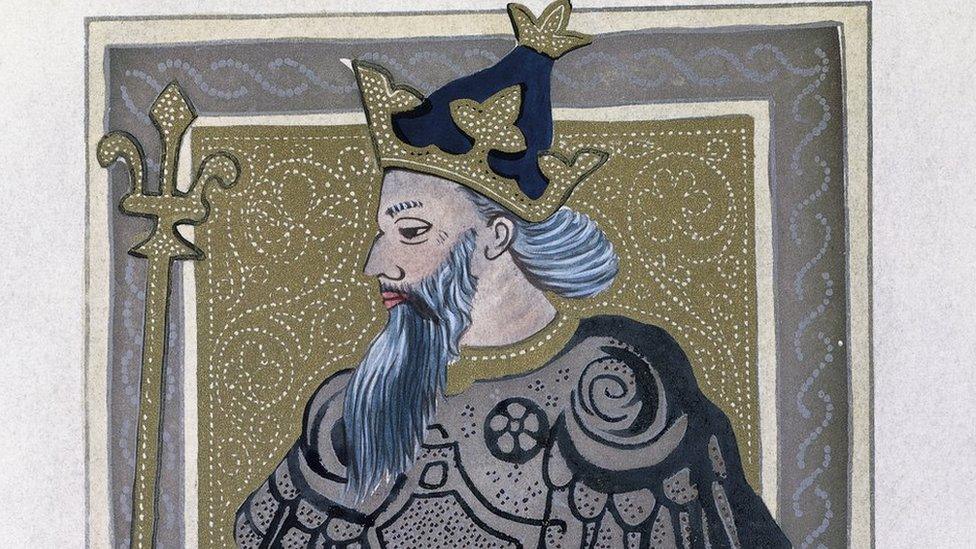ANC manifesto: Land, jobs and blockchain
- Published
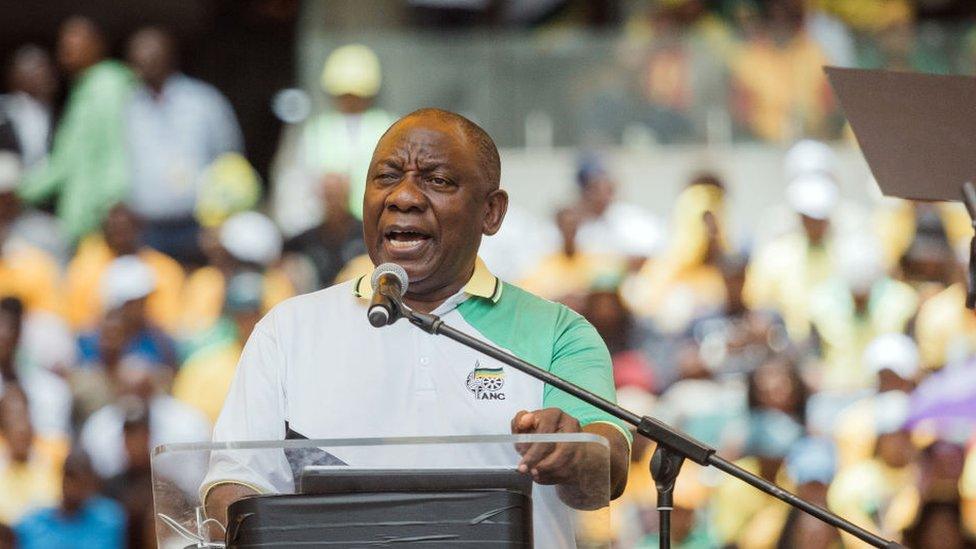
Mr Ramaphosa businessman-like style is starkly different from his predecessor
Ahead of South Africa's elections in May, President Cyril Ramaphosa unveiled the ruling African National Congress (ANC) manifesto. The BBC's Andrew Harding unpacks the key themes from his speech.
President Ramaphosa walked into a packed Moses Mabida stadium in the coastal city of Durban like a CEO preparing for a board meeting. No dancing. No singing. He delivered the ANC's manifesto speech with conviction, but no razzmatazz.
It was a sharp contrast with his controversial, man-of-the-people predecessor, Jacob Zuma, who had been greeted by his local crowd with a nostalgic roar of approval a few minutes earlier.
But President Ramaphosa is betting that after a decade of chaos and misrule under Zuma - a man now facing a corruption trial, and possible bankruptcy - South Africans are, overwhelmingly, looking for competence and honesty rather than grand promises and wild rhetoric.
The ANC may not have entirely made up its own mind on that score, but if, as expected, he can lead it to a comfortable victory in May- ideally, significantly more than the 53.9% that it managed in municipal elections in 2016 - then his position and his chances of becoming a two-term president, look secure.
Hence a speech that - in tone and content - sounded, more often than not, like that of a CEO rather than a politician.
Politics of land expropriation
Perhaps one shouldn't read too much into the length devoted to each issue in a speech.
But land reform - a divisive, emotive, deeply controversial issue that has often dominated the political debate over the past year - secured just 42 seconds in the president's 90 minutes manifesto speech.
Yes, South Africa's constitution will probably be amended this year to spell out the fact that the government can, in certain circumstances, expropriate land, which is mostly held by white farmers, without compensation, but don't expect a revolution.
The cautious Mr Ramaphosa knows it would spell economic disaster.
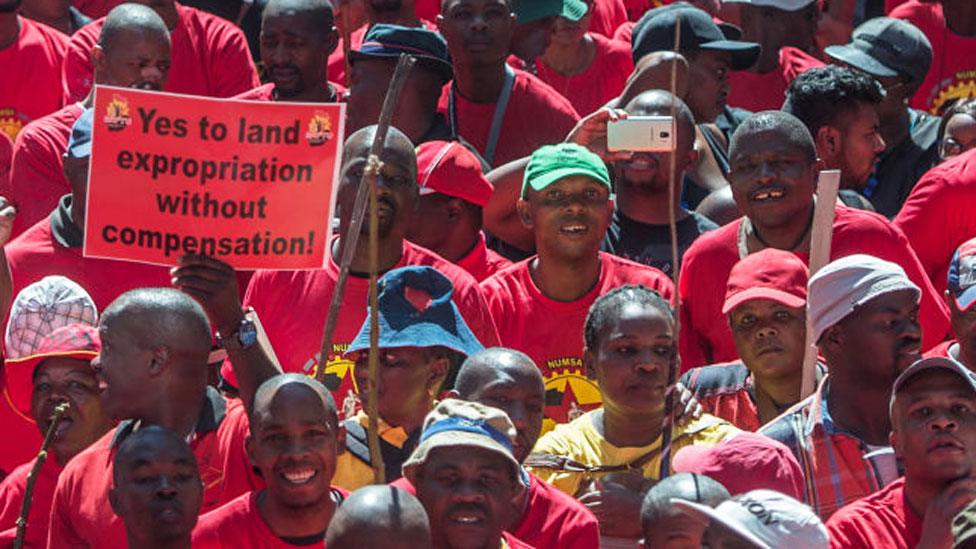
The radical EFF opposition party has made land expropriation without compensation a key campaign issue
Tellingly, his paragraph on land was preceded by a much longer one on another emotive issue, which he clearly believes will have more traction in poor townships.
The president won cheers when he promised to clamp down on illegal traders "wherever they come from."
The subtext was clear - the ANC understands its electorate's concerns about high levels of immigration, and the strains that creates in crowded, poor communities.
And there was a bigger, political point being scored here.
The ANC has, at times, seemed openly panicky about the threat posed by small, but radical and populist parties like the Economic Freedom Fighters (EFF) with their talk of nationalisation and land expropriation.
Mr Ramaphosa does not seem to share that panic.
His message to wavering voters is that the answer to inequality and poverty doesn't have to be revolutionary.
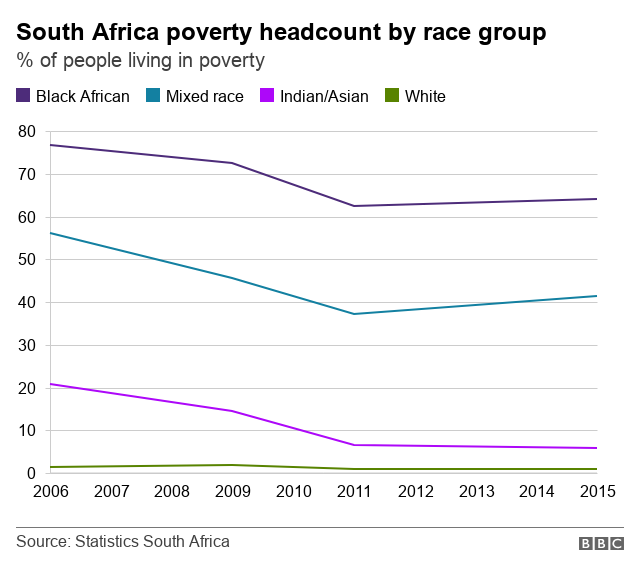
Rather it is about enforcing existing laws, cleaning up the civil service, and supporting private enterprise in rural communities and townships. It's a message designed to appeal to South Africa's instinctively conservative electorate.
Taking a stand against rape
Mr Ramaphosa talked about corruption, and about the failures of the ANC, and about many other troubles which South Africans have heard their politicians promise to fix since democracy first arrived here 25 years ago.
But sometimes it's important to shift the debate, and Mr Ramaphosa did that - to electrifying effect - towards the end of his time at the podium, when he abruptly urged every male ANC supporter in the stadium to get to his feet, and to make a commitment to fight against what the president described, twice, as a national crisis.
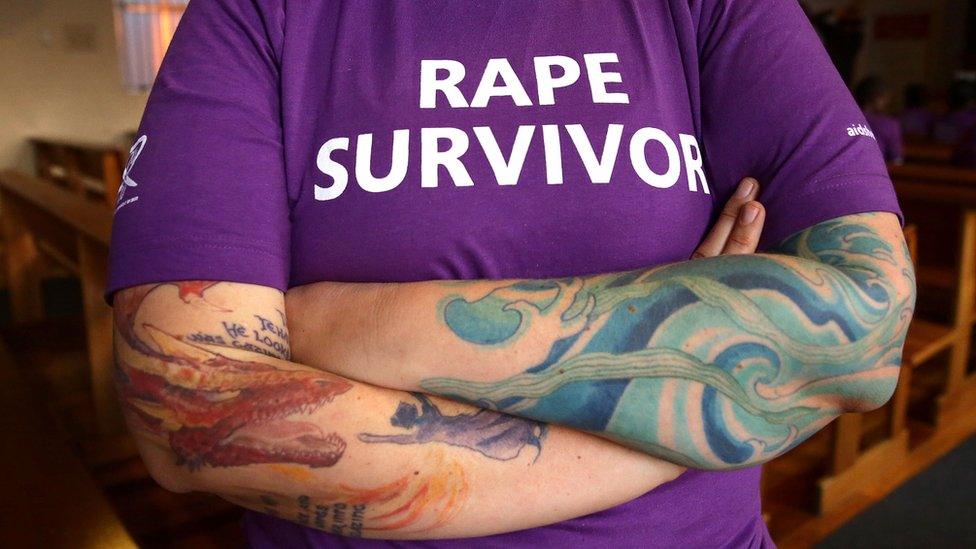
More than 40,000 cases of rape are reported every year in South Africa, most of the victims are female
He was talking about South Africa's extraordinarily high levels of rape and sexual violence against women - an issue all too often overshadowed here.
The men in the stadium all stood. Mr Ramaphosa applauded them.

Gender violence in South Africa
1 in 5 women are assaulted by their partner
More than 40,000 cases of rape are reported every year, most of the victims are female
Femicide in South Africa is 5 times higher than the global average
Source: Medical Research Council 2009 study; Stats SA Demographic and Health Survey 2016
Read more:

It felt like a rare, galvanising moment for a factionalised and tired governing party that often gives the impression - with its front ranks of familiar, ageing faces - that it is running out of ideas and of steam.
Mr Ramaphosa has repeatedly promised South Africans "a new dawn." At that moment, it felt like he meant it, and that his supporters believed it.
Creating jobs
Every year, the ANC promises to create more jobs in a country which now boasts the highest levels of youth unemployment in the world.
Former President Zuma once promised to create five million jobs in a decade. He failed, but blamed that failure on the global recession and on a multitude of other factors.
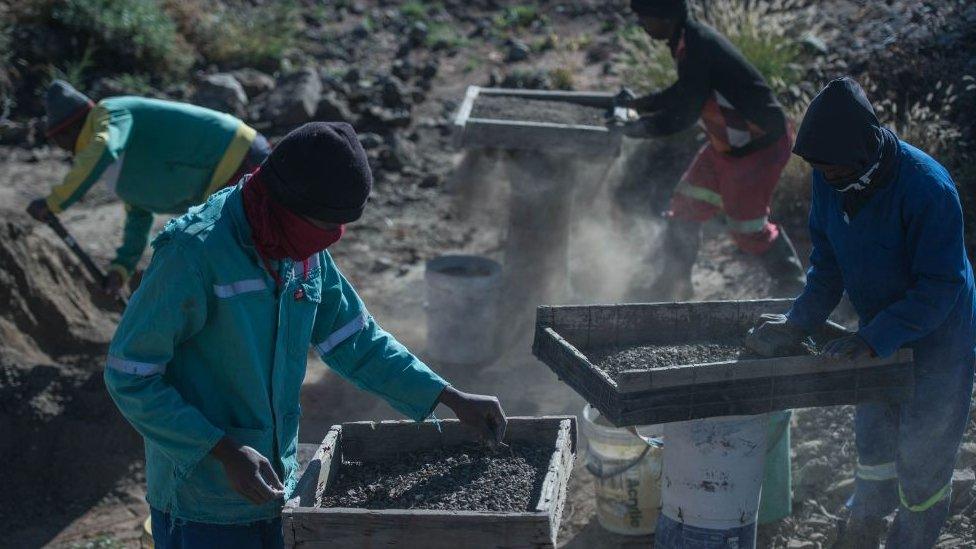
Providing jobs for the youth remains ANC's biggest challenge
In Durban, President Ramaphosa came up with a new figure. 275,000 new jobs a year - a significantly more modest pace.
But can he - could anyone - deliver?
"We have a plan," Mr Ramaphosa insisted. And my impression is that many South Africans, and plenty of foreign investors, seem inclined to believe him, or at least to give him the benefit of the doubt.
The president - a wealthy businessman - spoke with almost nerdish enthusiasm about investment and infrastructure projects, about reducing the cost of doing business, cutting red tape, improving broadband connectivity and so on.
"After a period of doubt and uncertainty we have arrived at a moment of hope and renewal," he said, describing the ways his government has already begun to tackle corruption and strengthen the state institutions that were so badly undermined during the Mr Zuma's era.
But if Mr Ramaphosa is earnest, and committed, what about his party?
ANC feuding
The opinion polls suggest the ruling party under Mr Ramaphosa will secure a comfortable victory in this year's elections.
But the scale of the challenges facing South Africa is enormous, and there are many here in South Africa who wonder if President Ramaphosa - conscientious, process-driven, and moderate - and his feuding, corruption-riddled party can really change direction after so long in power and implement its ambitious plans.
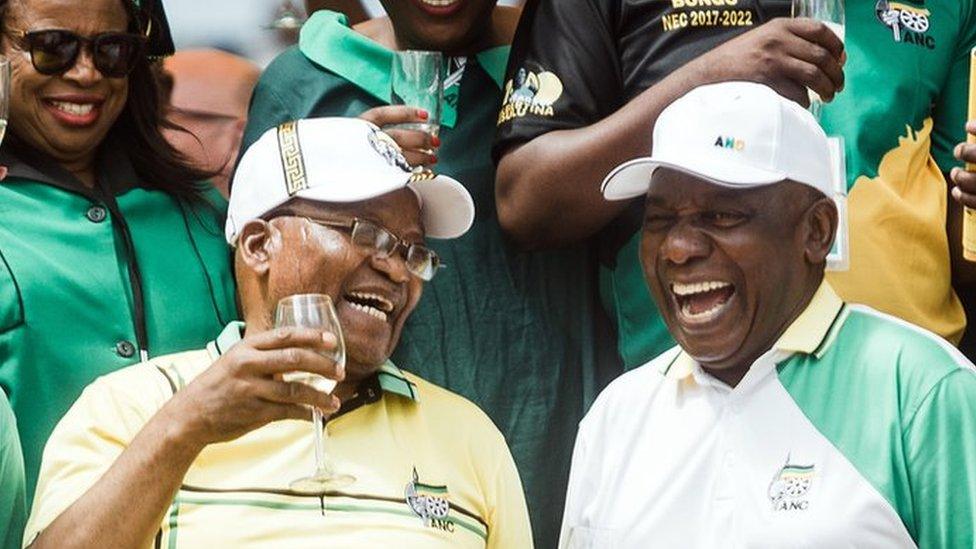
ANC is caught in a feud between allies of former President Zuma (C) and President Ramaphosa (L)
One section of the speech gave me particular pause for thought on that.
South Africa's education system is failing the country's youth.
The statistics repeatedly show that, despite a big education budget, many students are dropping out or emerging with basic maths and reading skills so poor that they are fundamentally unfit for the workplace.
Internet of Things and blockchain
The state of education is yet another national crisis, and unless it is fixed, South Africa's unemployment figures and its economy will surely continue to struggle.
But in his manifesto speech, Mr Ramaphosa said precious little about how to get the basics of education right - how to ensure teachers stay in class; how to engage with powerful teaching unions.
Instead, in a paragraph that seemed to have flown in from Davos, rather than reflecting the realities of a poor township like Diepsloot, Mr Ramaphosa talked about the 4th industrial revolution, blockchains, data analytics, and the internet of things.
It was ambitious, and impressive. But half the country's youth is unemployed and more fundamental changes seem urgently required.

You may also be interested in:

- Published22 May 2017

- Published17 June 2024
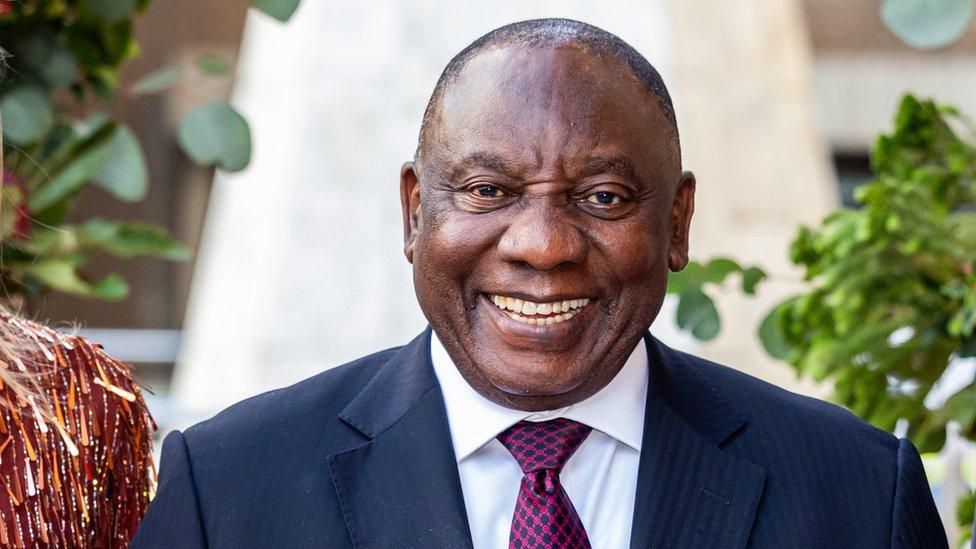
- Published7 November 2018
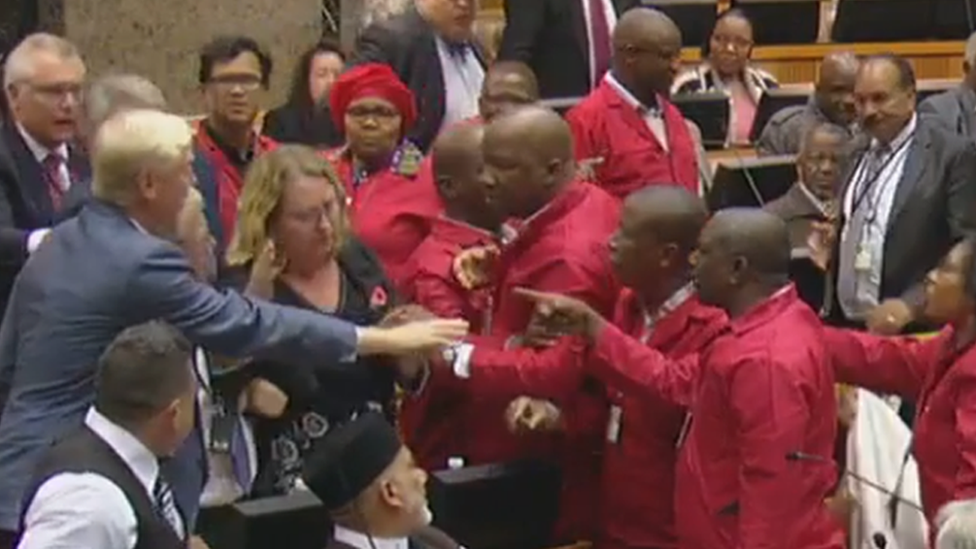
- Published16 July 2018
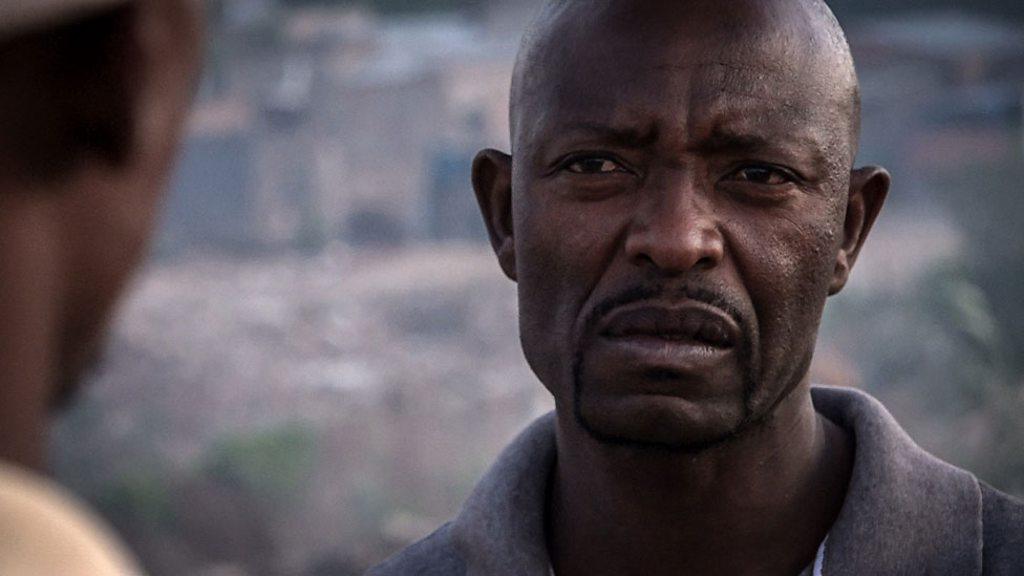
- Published16 July 2018
